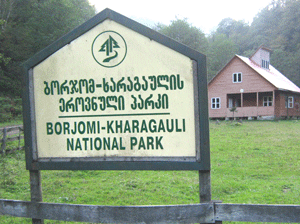Tamuna Uchidze, Borjomi, Newspaper “Samkhretis Karibche”
 Quite a large part of the Borjomi-Kharagauli National Park will be destroyed! 500-kilowatt electricity wire shall be stretched across the preserved territory.
Quite a large part of the Borjomi-Kharagauli National Park will be destroyed! 500-kilowatt electricity wire shall be stretched across the preserved territory.
Ministry of Energy of Georgia intends to increase the network of electricity supply of the country. Within the project, the ministry plans to finish the high-voltage electricity transmitting line in the south of Georgia which will connect Gardabani and Zestaponi and will reach Turkish border through Akhaltsikhe district; it will connect the energo-system of Turkey. The project is funded by the Reconstruction and Development Bank of Europe, Investment Bank of Europe and Reconstruction Bank of Germany.
In order to reduce the crisis in the country after the war in August of 2008, international financial institutes promised Georgia to allocate 4, 55 billion USD. Most part of the sum will be spent on the infrastructure and energetic projects.
The construction of the electricity transmitting line started during Soviet Union but it stopped in 1992. Currently, the line will run through Borjomi-Kharagauli National Park and through other preserved territories too. More precisely, it will run through preserved territories in Ktsia-Tabatskuri and Gardabani.
The project offers three variants of crossing Borjomi Valley. If the first alternative is chosen, the line will go across 11, 5 kilometers of forest in the National Park; the second will runs through 4, 7 kilometers of the territory which is not forest and the third will run across the largest area of the forest which is supposed to be attached to the National Park in near future.
Program Coordinator of the non-governmental organization “Green Alternative” Irakli Macharashvili said that National Park will be less impacted in the second alternative. According to him, the administration of the National Park and consultant hired for the exploration of the impact on the environment support the second alternative. “The Ministry of Energy tries to influence the Ministry of Environment and use the cheapest way – the first alternative which causes biggest damage on the park.”
Ministry of Energy of Georgia Aleksandre Khetaguri does not see anything urgent in the project. “Construction of the house can also impact the environment in any place. There are many national parks in the world where the electricity wires are stretched.”
Irakli Macharashvili clarifies that construction will damage flora and fauna; the threat of fire in the forest will increase and the landscape will be polluted; consequently, the park will be less attractive for tourists. “Thus, the project will have long social and negative impact on the environment.”
Samtskhe-Javakheti regional governor and former head of forest department Lasha Chkhadua said: “I do not know exact amount of the forest which will be cut down before construction starts. However, I am sure, the project is very important for the country and of course for the region too. Many people will be employed. The project is huge and its impact on the environment will also be envisaged.”
“Reconstruction activities are also envisaged within the project; we will plant as many trees as many we will cut down,” said Aleksandre Khetaguri.
Irakli Macharashvili claims the opposite. “Nothing is mentioned about the reimbursement of the damage to the environment in the document.” He added that cutting down of trees on the vast downhill will damage not only the eco-system of the forest but it will create danger for the electricity transmitting line too.
Residents of Borjomi still remember August of 2008 when the forest in Tsaghveri was all in smoke for one month. “Do you thinks we will stand new fire and smoke here?! Our government wants to finish with us what Russia could not do in its time. If there is a fire, will the newly planted tree resolve the problem?!” asked resident of Borjomi Nunu tsikarishvili.
Director of Borjom-Kharagauli National Park Toma Dekanoidze does not comment on the project. Spokesperson of the Ministry of Environment and Natural Resources Eka Bendeliani said the international and national non-governmental organizations request not the lead the line through the National Park and “specialists work on the issue.”
Minister of Energy is still categorical about the issue and states the line will go through the National Park “however, it will cause minimum damage to the environment.”
Ministry of Environment worked out the draft amendments to the Code about Forest of Georgia. According to the document, during implementing the important projects, forest can be cut down on the downhill of 35 degree without any restriction. Consequently, restrictions, which envisaged cutting down of the trees after a special survey and only with the support of rope-way and air transport, are annulled; previous restriction also requested to restore the forest.
Chkadua appreciates the amendments to the law. “Very often the law did not allow us to implement large projects like construction of the Tbilisi-Akhalkalaki central high-way. There were three trees from the Red Book on the road and we could not cut them.”
Irakli Macharashvili makes contradictory assessment of the draft amendments. “They are introducing amendments to the law because of this project. The government intends to damage the National Park even more than it was damaged as a result of the Russian aggression; the government spends the money allocated for the liquidation of the results of the Russian aggression on this project.”
Borjomi-Kharagauli National Park is the first national park in the south Caucasus. Its territory is more than one percent of the entire territory of Georgia. Aboriginal ecological systems are preserved in the park and many endemic, relict and endangered species of animals live in the park; they are protected by national and international laws.
The future will show us what will be the impact of the energetic project on the national park. After the amendments are made to the law, implementation of such “important projects” is the plan for future in the National Park.
Source: www.regions.ge



